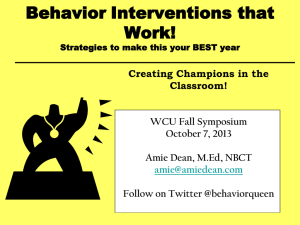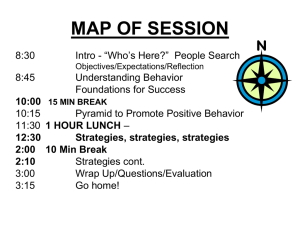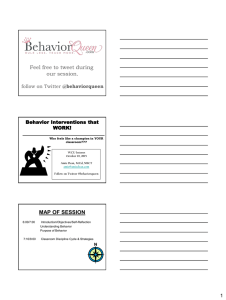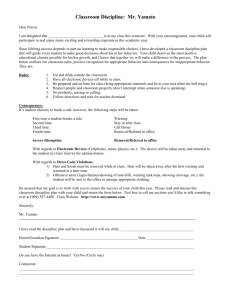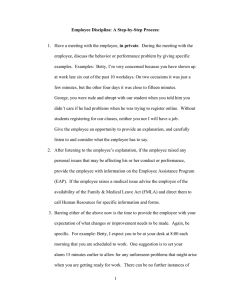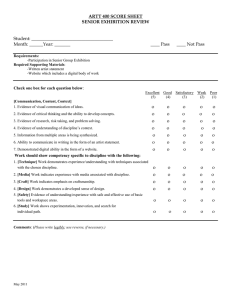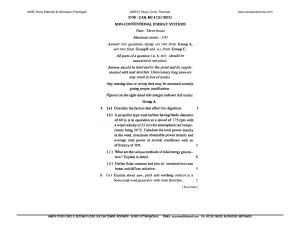Please feel free to tweet .
advertisement
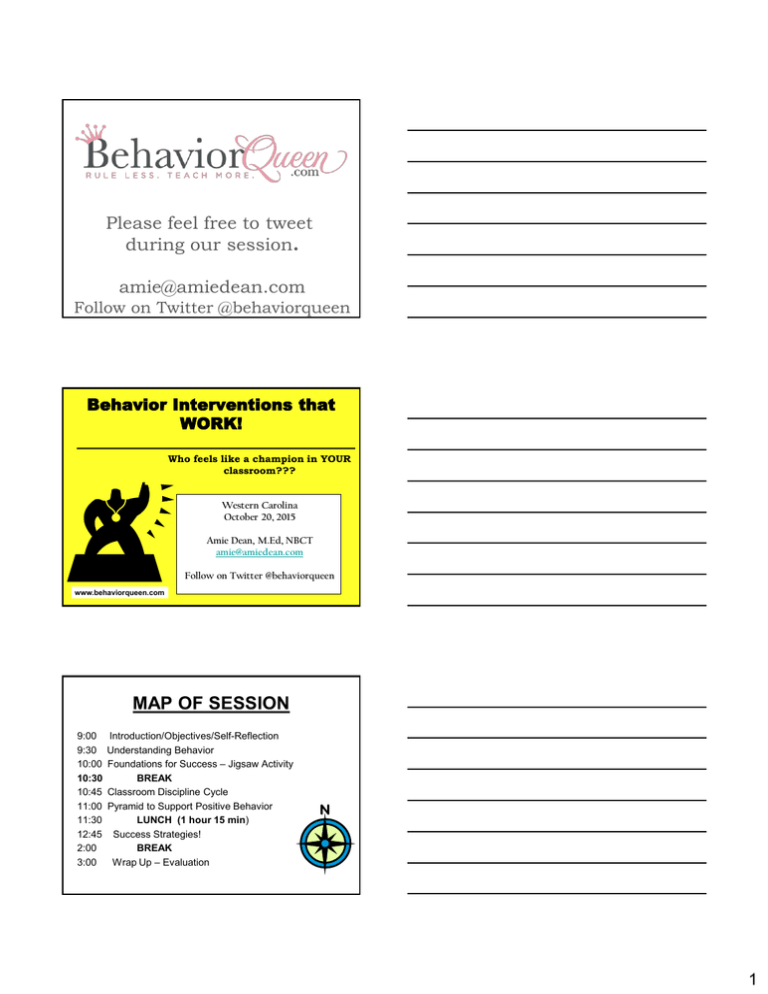
Please feel free to tweet during our session. amie@amiedean.com Follow on Twitter @behaviorqueen Behavior Interventions that WORK! Who feels like a champion in YOUR classroom??? Western Carolina October 20, 2015 Amie Dean, M.Ed, NBCT amie@amiedean.com Follow on Twitter @behaviorqueen www.behaviorqueen.com MAP OF SESSION 9:00 9:30 10:00 10:30 10:45 11:00 11:30 12:45 2:00 3:00 Introduction/Objectives/Self-Reflection Understanding Behavior Foundations for Success – Jigsaw Activity BREAK Classroom Discipline Cycle Pyramid to Support Positive Behavior LUNCH (1 hour 15 min) Success Strategies! BREAK Wrap Up – Evaluation 1 What do I want to accomplish in this seminar? Please answer these 3 questions. 1. What am I doing that is successful? 2. What am I doing that is NOT working? 3. What is my #1 GOAL for my students this semester? Please share #2 with people around you. Questions to Consider …. 1. Where do we learn about “respect?” 2. How do you TEACH a “disrespectful” student to show you respect? 3. Where do we learn about how to deal with disappointment or failure? 2 Community Agreement 1. (2-3) non-negotiables (what teacher needs) 2. (3) Replacement Behaviors (Bx) 3. In this we agree* __________ __________ __________ *Solicit from students what they need to feel respected WhatW What’s Bugging You? Solution Wheel 3 Statistics About Behavior GOOD NEWS! 90% of students do what they are supposed to do 1-4 “Richards” 5….. 6+…. Purpose of Behavior Get Get Out Foundation 1 • PUBLIC RULES, PRIVATE DISCIPLINE • Students will accept discipline – Not disrespect. • What are some ways teachers exhibit disrespect? – 1. – 2. – 3. – 4. Discuss with Colleagues 4 Foundation 2 • RELATIONSHIPS: Our influence lasts only as long as the relationship lasts. • “They don’t care what we know until they know we care.” • You can mean business without being mean. *Identify ways we can build/retain relationships with our students. Relationship Builders • • • • Team Time (on pg. 19) Meet and Greet – Take Temperature Free Your Mind Fridays Partners in Learning/Tribes – books for Secondary • Conversation Circles • 10-10-10 10 days, 10 questions, 10 min • Responsiveclassroom.org Foundation 3 Students need to know 3 things…... #1 Where they stand.. X You have to teach, demonstrate, and reinforce procedures. (procedure manual) “Please refer to classroom rule # “ X The best discipline is effective teaching. 5 #2 The teacher WILL follow through H If you tolerate it day after day … you teach it day after day. (p.34) # 3 The teacher is on their side! Discipline decisions need to be based on rules and goals not on feelings. -Ask yourself…What is my goal here? Teachers need to give themselves permission to be less than perfect - not less than professional. MOTIVATION = SELF CONFIDENCE + ENGAGEMENT! LET’S MOVE! • PEOPLE SEARCH • INVENTORY • SMART CARD – KAGANONLINE.COM Classroom discipline cycle Level One Infractions in Classroom #1 Reminder 1 - Non-Verbal Warning • Post-it • Red Rule • Correction Card #2 -“The Look,” -Proximity -Touch Pad -Neon Clipboard -Tally -Hand Signal Reminder 2 - Verbal Warning – • Positively remind student what you want to see (“Thank you for getting to work.” ) • “If you choose to continue ________, you choose ________.” • Let them know the next infraction will result in consequence #3 Reminder 3 - Consequence Menu –Teacher Discretion • • • • Loss of privilege – flip the card – punch the card Last to Leave Silent lunch Apology Slip or Better Choices Sheet (in handout) More punitive • Time Out in another classroom & complete “Reflection Form” • Parent Contact – 3-5 day Behavior Contract (optional) #4 Consequence Office Referral – loss points 6 WEBSITES TO HIGHLIGHT • • • • liveschoolinc.com Classdojo.com Newmanagement.com Wholebrainteaching.com Pyramid to Promote Positive Behavior Let’s explore strategies for each component. There are 5 components. REFERRAL ----------------------- Tier Three 5-10% Students SMALL GROUP RESOLUTION --------------------------------------------- INTERVENTION/ REFLECTION Tier Two 10-20% Students --------------------------------------------------------------------------- POSITIVE INSTRUCTION Tier One 80-90% Students PREVENTION Pg. 12 in your handout Prevention • • • • • Post the rules (by the clock) Explain it then expect it. Proximity control (room arrangement). Be organized. Call To Attention Signal. (C2A) • Hand on a Stick – Raise hands/Answer freely • Positive tone – ASK A QUESTION • TALLY SYSTEM 7 Introducing the “Tally System” to your students! 1. Ask these 2 questions: – – What is your goal in this class? What do you think my goal is? 2. Solicit responses about goals, then ask what BEHAVIORS do we need to achieve those goals? 3. When they mention “talking, noise, or raise hands” – share your data about interruptions. 4. Ask what they feel is a “fair” number of disruptions. 5. Start with 5 in a 60 minute period. (Will vary by age) 6. Decide on a visual way to keep up each day. 7. Decide on a visual to keep up with long-term progress. 8. Generate list of rewards & vote on a class reward. Positive Instruction • Business-like approach • Success Strategies – Correction Cards – Promote Handraising – Less voice, more non-verbals • Voice is for Instruction and Affirmation • Positive Phrasing – Ask a question – be inviting Intervention/Reflection • Apology Form • Better Choices Sheet • Yes Card 8 Referral • Teacher needs help if … – Student hurts himself – Student hurts another – Student destroys property worth more than $5 THE DIRTY DOZEN Mistakes to avoid... ' ' ' ' ' ' ' ' ' ' ' ' Inconsistency. Excessive Warnings Excessive public/verbal discipline. Majoring in the minors. Low Level distractions Arguments / Power struggles. Not teaching procedures. Being too tolerant. Emphasizing the negative. Disrespectful interventions. Losing control/Behaving unprofessionally. Discarding the plan when it doesn’t go as you expected. “yellow light classrooms” Examples of Choices/Options 1. 2. 3. 4. 5. 6. 7. 8. 9. Put your desks in circles or rows? Whisper or talk quietly? Clap or snap for friends? Walk down this hall or that hall? Have lights on or off? Music on or off? Read on the floor or in your seat? Pass your papers in to the front or to the back? Stop reading now or 5 minutes from now? Would you like to put that away or would you like for me to put it away? 10. WHY DOES THIS WORK? Deposits and withdrawals.... 9 Examples of Choices/Options 1. Options for how students can demonstrate what they know – the seven P’s: Participation, Projects, Performances, Presentations, Portfolios, Products, Problem Posing & Analysis *Let students choose several to do for a unit of study. 2. Give 5 homework options a week. Students choose 3. 3. Give students one free homework pass each quarter. 4. Create 120 point tests in which students need to complete items totaling 100 points including some required items. 5. Allow students to develop their own project ideas as long as it meets criteria. 6. Give students option of creating one 3x5 study card to be used during a test. *By creating the card they have made a lot of effort to learn the content. Discuss with a partner… What are the 2 main reasons the disruptive student acts out? Why give choices??? Choices = _________ Thank you for your time! Please fill out an evaluation. amie@amiedean.com Follow on Twitter @behaviorqueen 10
